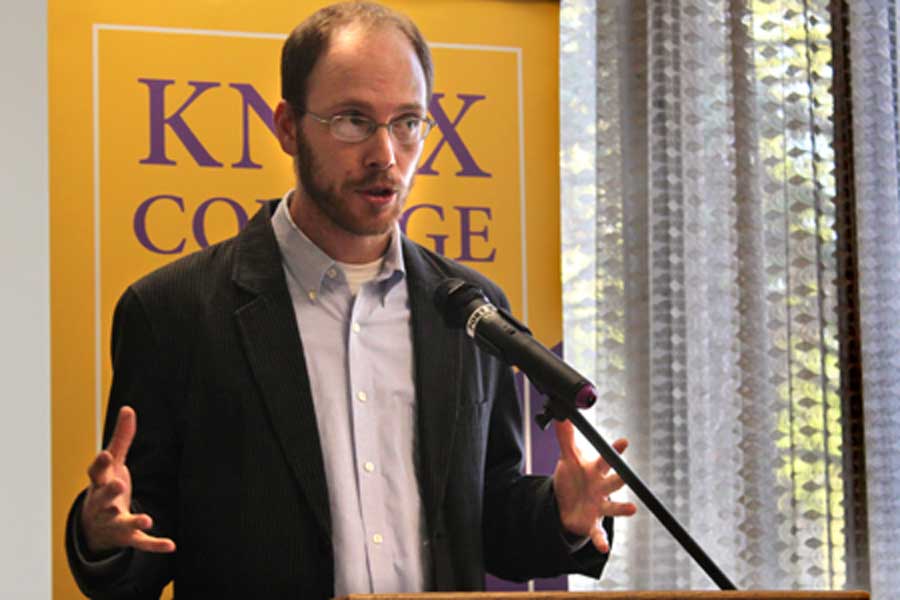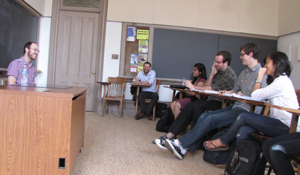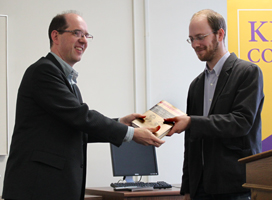

Venture Boldly

Adriana Colindres
Features Editor
2 East South Street
Galesburg, IL 61401


Article by Stephen Danilovich '14
Photography by Mia Sol del Valle '15
Award-winning journalist Jonathan Katz, former chief correspondent in Haiti for The Associated Press, visited Knox College to share his experiences as a reporter in Haiti during and after the devastating 2010 earthquake there. Katz described conditions in post-earthquake Haiti and his views on how international aid efforts have failed to provide a long-term solution for the impoverished country's problems.
His April 4 lecture was titled, "The Big Truck That Went By: Reconstruction and Missed Opportunity in Post-Earthquake Haiti." Katz's appearance was sponsored by the Eleanor Stellyes Center for Global Studies, which brings guest speakers from around the world to the Knox campus.
At the time of the January 12, 2010, earthquake, Katz was the only full-time correspondent from the United States stationed in Haiti. He escaped the wreckage of his home and became the first member of the international media to report news about the earthquake, borrowing a BlackBerry from a stranger so he could call an editor.
Katz read from the manuscript of his forthcoming book, The Big Truck That Went By: How the World Came to Save Haiti and Left Behind a Disaster. In one excerpt, he delivered a compelling account of the earthquake as it hit the two-story building where he was working and living.
Throughout the lecture, Katz discussed the shortcomings of the aid effort in Haiti after the earthquake, describing how it failed because of the lack of coordination and a long-term strategy, especially among numerous non-governmental organizations (NGOs).
"Very quickly after the earthquake, you saw that the services they were providing were not responses to the earthquake," he said. "They were responses to the general situation that had been present in Haiti even before the earthquake."
While NGOs provided some temporary relief, they did not develop a sustainable way to revitalize Haiti, according to Katz. When the organizations ran out of funding, they left the island country.
"What they've left behind is the same thing that would happen if you were operating on a patient and you left in the middle," he said.
Katz remained in Haiti through 2011 to report on the aftermath of the earthquake. He also helped trace the source of a deadly cholera epidemic in Haiti to an unsanitary base housing United Nations peacekeepers.
Katz's presentation attracted a capacity crowd of more than 80 Knox students and others in Seymour Union's Ferris Lounge. He also spoke to students in Comparative Democratization, a class taught by Assistant Professor of Political Science Daniel Beers, who invited Katz to campus.
Matt Barry, a Knox junior from Homewood, Illinois, said he attended the lecture because of a class he took last term with Beers.
"We focused a good deal on Haiti in my (Survey of Comparative Politics) class, and I thought it would be really interesting to hear from a guy who was clearly very knowledgeable about the country," Barry said.
Tom Courtright, a Knox sophomore from Moshi, Tanzania, said he enjoyed "how (Katz) was so honest with how problematic the aid situation is in Haiti."
 Courtright participated in the question-and-answer session with Katz, saying: "Knox College is a very activist college, if you will. We love trying to help out other places ... apart from research, what else can we do as students to try to develop better methods for development and aid?"
Courtright participated in the question-and-answer session with Katz, saying: "Knox College is a very activist college, if you will. We love trying to help out other places ... apart from research, what else can we do as students to try to develop better methods for development and aid?"
Katz responded by saying that it was a matter of understanding the country that you are trying to help.
"I think that it's really useful to go to places and get to know people from other cultures. It's certainly necessary if you're going to work in any capacity with people from those countries or cultures," he said. "As students, you need to study, really get to know these places, and really get to know the context in which you're intervening. Be humble."
Beers, who also teaches classes in international development and comparative democratization, said he invited Katz because of his "on-the-ground experience with the issues that we talk about in class -- experience that is richer and deeper than almost anybody I can think of."
"There is a really important and ongoing debate about the role of foreign aid in the process of development in what we used to call Third World countries," Beers added. "I hope people will get inspired to find out more and understand the problems of the developing world better."
(Photo above right: Jonathan Katz speaks to students in the Comparative Democratization class taught by Assistant Professor Daniel Beers. Photo above left: Jonathan Katz receives a copy of the book, The Lincoln-Douglas Debates: The Lincoln Studies Center Edition, co-edited by Rodney O. Davis and Douglas L. Wilson of Knox College.)
Published on April 06, 2012